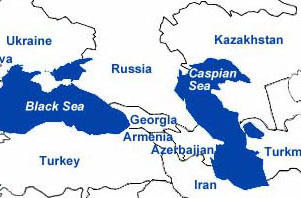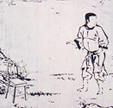Con Son Ghraibtanamo
During the Vietnam War, a Congressional aide named Tom Harkin persuaded two Congressman to investigate claims of torture in the “tiger cages” at the U.S.-run prison camp on Con Son Island. With them was Don Luce, from the International Voluntary Services and the World Council of Churches:
…Using maps drawn by a former Tiger Cage prisoner, we diverted from the planned tour and hurried down an alleyway between two prison buildings. We found the tiny door that led to the cages between the prison walls. A guard inside heard the commotion outside and opened the door. We walked in.
The faces of the prisoners in the cages below are still etched indelibly in my mind: the man with three fingers cut off; the man (soon to die) from Quang Tri province whose skull was split open; and the Buddhist monk from Hue who spoke intensely about the repression of the Buddhists. I remember clearly the terrible stench from diarrhea and the open sores where shackles cut into the prisoners’ ankles. “Donnez-moi de l’eau” (Give me water), they begged. They sent us scurrying between cells to check on other prisoners’ health and continued to ask for water.
The photos that Harkin, today a U.S. Senator from Iowa, took were printed in Life magazine (July 17, 1970). The international protest which resulted brought about the transfer of the 180 men and 300 women from the Cages. Some were sent to other prisons. Some were sent to mental institutions.
…Soon after the expose in Life, Congressman Philip Crane (R, Illinois) visited Con Son and declared “the Tiger Cages are cleaner than the average Vietnamese home.” He could not understand afterward why even the most pro-American of Vietnamese newspapers condemned him strongly and even hinted that his remarks were racist.
Prisoners were beaten, subjected to electric shocks, and hung in chains on the walls. The U.S. government expressed surprise and concern about the conditions at Con Son. Plans for a new prison were announced. Raymond, Morrison, Knutson-Brown Root and Jones got the contract. Money for the new prison came from the U.S. Food for Peace program. Today, Kellogg, Brown and Root — a Halliburton subsidiary — is building a new prison in the U.S. base at Guantanamo Bay, Cuba.
…Using maps drawn by a former Tiger Cage prisoner, we diverted from the planned tour and hurried down an alleyway between two prison buildings. We found the tiny door that led to the cages between the prison walls. A guard inside heard the commotion outside and opened the door. We walked in.
The faces of the prisoners in the cages below are still etched indelibly in my mind: the man with three fingers cut off; the man (soon to die) from Quang Tri province whose skull was split open; and the Buddhist monk from Hue who spoke intensely about the repression of the Buddhists. I remember clearly the terrible stench from diarrhea and the open sores where shackles cut into the prisoners’ ankles. “Donnez-moi de l’eau” (Give me water), they begged. They sent us scurrying between cells to check on other prisoners’ health and continued to ask for water.
The photos that Harkin, today a U.S. Senator from Iowa, took were printed in Life magazine (July 17, 1970). The international protest which resulted brought about the transfer of the 180 men and 300 women from the Cages. Some were sent to other prisons. Some were sent to mental institutions.
…Soon after the expose in Life, Congressman Philip Crane (R, Illinois) visited Con Son and declared “the Tiger Cages are cleaner than the average Vietnamese home.” He could not understand afterward why even the most pro-American of Vietnamese newspapers condemned him strongly and even hinted that his remarks were racist.
Prisoners were beaten, subjected to electric shocks, and hung in chains on the walls. The U.S. government expressed surprise and concern about the conditions at Con Son. Plans for a new prison were announced. Raymond, Morrison, Knutson-Brown Root and Jones got the contract. Money for the new prison came from the U.S. Food for Peace program. Today, Kellogg, Brown and Root — a Halliburton subsidiary — is building a new prison in the U.S. base at Guantanamo Bay, Cuba.



